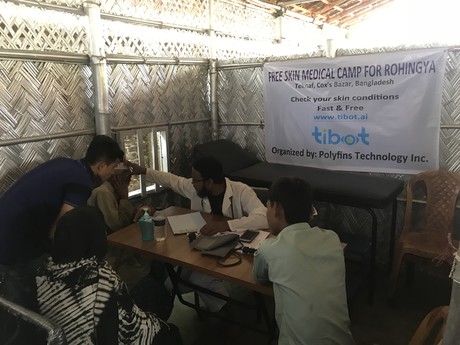How AI is helping Rohingya refugee health

Refugee camps are fertile ground for contagious diseases, including skin manifestations.
So for the more than 700,000 Rohingya refugees who’ve fled Myanmar in the past year, finding temporary shelter across the border in Bangladesh’s Cox’s Bazar district, their overcrowded, unhygienic living conditions have made them vulnerable to infections and other diseases — a problem the United Nations has called “immense”, with healthcare services “grossly under-funded.”
Help in addressing these distant needs is coming from a Silicon Valley healthcare start-up, Polyfins, whose AI-powered mobile app can help dermatologists diagnose skin conditions that often hold strong clues to underlying disease — ranging from common conditions like eczema to serious ones like tumours, infections and parasitic infestations.
Polyfins, a member of the NVIDIA Inception program, worked with Bangladeshi authorities to bring two dermatologists and several nurses to the refugee camp. The team saw around 500 patients over two days.
The dermatologists used Polyfins’ Tibot smartphone app as a diagnostic aid on one day, and used traditional diagnostic methods on the other. They found that they were able to see 25% more cases if the patients’ symptoms were first analysed by a nurse using the app.

AI as diagnostic aid
Tibot requires users to upload an image of the skin condition and answer questions about their symptoms. The responses and a compressed version of the image are then sent to Polyfins’ server, which sends back its prediction of the top three skin conditions the user might have.
The app’s analyses allowed the doctors to see more patients at the medical camp, which in turn enabled Polyfins to distribute much-needed medication to a larger number of patients in the camp.
The AI behind the app was trained on a dataset of 100,000 images from public sources, research partners and hospitals Polyfins works with. While developing its app, the start-up collaborated with doctors to label the image data and provide guidance on identifying disease symptoms.
Since launching in June 2018, the app has analysed 15,000 cases.
Beyond diagnosis
Based in California, with teams in India and Bangladesh, Polyfins is also partnering with dermatologists at the D. Y. Patil Hospital in Mumbai, India, on a forthcoming paper to evaluate the accuracy, sensitivity and specificity of their deep learning model.
Basar sees the tool as a more effective alternative for people who use a search engine to figure out what conditions they might have.
The team plans to add additional features to the app beyond diagnostics — such as care recommendations, virtual visits with physicians and follow-up of skin lesions over time. Polyfins’ goal is to make Tibot a complete skin management app that leverages AI.
Why physical device security is becoming a patient privacy issue in health care
One of the most immediate and preventable risks to patient data often goes overlooked: the...
Food waste in Australian hospitals and aged care homes — can AI help?
After working in hospitals, an Australian researcher has considered how hospitals and aged care...
From vision to vigilance: building a secure digital future for health care
Digital health adoption offers clear benefits, yet Australians continue to scrutinise how their...



![[New Zealand] Transform from Security Awareness to a Security Culture: A Vital Shift for SMB Healthcare — Webinar](https://d1v1e13ebw3o15.cloudfront.net/data/89856/wfmedia_thumb/..jpg)
![[Australia] Transform from Security Awareness to a Security Culture: A Vital Shift for SMB Healthcare — Webinar](https://d1v1e13ebw3o15.cloudfront.net/data/89855/wfmedia_thumb/..jpg)




